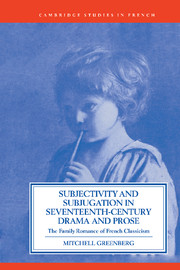 Subjectivity and Subjugation in Seventeenth-Century Drama and Prose
Subjectivity and Subjugation in Seventeenth-Century Drama and Prose Book contents
- Frontmatter
- Contents
- Preface
- Introduction
- 1 L'Astrée and androgyny
- 2 The grateful dead: Corneille's tragedy and the subject of history
- 3 Passion play: Jeanne des Anges, devils, hysteria and the incorporation of the classical subject
- 4 Rodogune: sons and lovers
- 5 Molière's Tartuffe and the scandal of insight
- 6 Racine's children
- 7 “Visions are seldom all they seem”: La Princesse de Clèves and the end of Classical illusions
- Notes
- Index
- Cambridge Studies in French
2 - The grateful dead: Corneille's tragedy and the subject of history
Published online by Cambridge University Press: 16 October 2009
- Frontmatter
- Contents
- Preface
- Introduction
- 1 L'Astrée and androgyny
- 2 The grateful dead: Corneille's tragedy and the subject of history
- 3 Passion play: Jeanne des Anges, devils, hysteria and the incorporation of the classical subject
- 4 Rodogune: sons and lovers
- 5 Molière's Tartuffe and the scandal of insight
- 6 Racine's children
- 7 “Visions are seldom all they seem”: La Princesse de Clèves and the end of Classical illusions
- Notes
- Index
- Cambridge Studies in French
Summary
Le passé est le lieu d'intérêt et de plaisir qui situe hors des problèmes présents du prince, du côté de l'“opinion” et de la curiosité du public, la scène où l'historien joue son rôle de technicien-substitut du prince.
(M. de Certeau, L'Ecriture de l'histoire, p. 17)Although Corneille entered the tragic universe through the door of myth (Médée), his great tragedies, those plays that in his own time set him apart from his contemporaries as the creator of a new, powerful dramaturgy, are firmly rooted in history. Le Cid, Horace, Cinna and Polyeucte, despite the obvious differences in their plots and dramatic peripeteia, are all subtended by a historical imperative, a recourse to history as the impetus and motivation of tragic mimesis. In Corneille's plays the imbrication of history and tragedy forms a locus of overlapping, and at times contradictory, forces that circumscribe the emergence of the Classical subject. This subject, in turn, is implicated in the forms pleasure and power take in Cornelian dramaturgy as it reflects and traces the parameters of the nascent Absolutism of seventeenth-century France.
The Cornelian gesture of tragic “translation” from the universe of myth to the world of history is significant in its own right. Could we not see in this shift that initial move separating what J.M. Apostolidès has, following contemporary sociological discourse, described as the distinguishing feature of two types of societies, “those without history and those with access to historical understanding”?
- Type
- Chapter
- Information
- Subjectivity and Subjugation in Seventeenth-Century Drama and ProseThe Family Romance of French Classicism, pp. 48 - 64Publisher: Cambridge University PressPrint publication year: 1992


